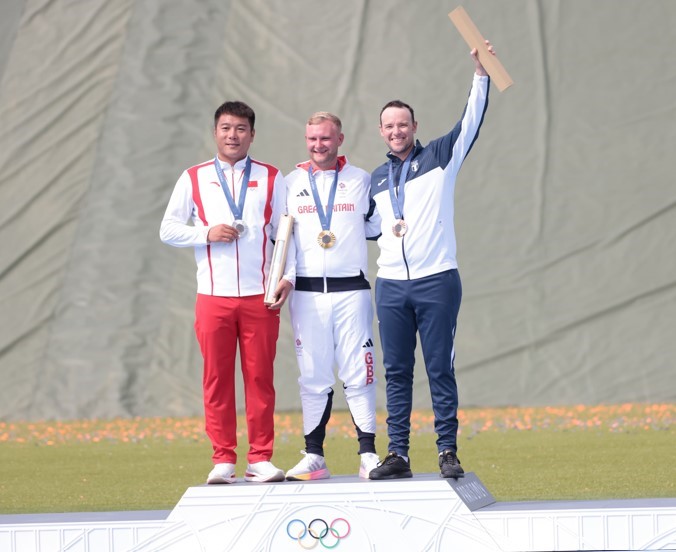Nathan Hales, Britain’s world record holder in the trap men event, is now Olympic champion also after a super-cool performance on a long day of pulverising heat which saw him raise the Olympic record from 43 to 48 as he crushed the lingering challenge of China’s Qi Ying, who claimed silver on 44.
It was Britain’s first Olympic shooting sport gold since the double trap at the London 2012 Games was won by Peter Wilson – who Hales thanked afterwards for his input into his preparations over the past couple of years.
Bronze, meanwhile, went to Guatemala’s 41-year-old Jean Pierre Brol Cardenas, who thus earned what was only his country’s second Olympic medal following the men’s 20km walk silver secured by Erick Barrondo at London 2012.
Cardenas had made one previous Olympic appearance – at those same London Games – but both the gold and silver medallists were making their Games debuts. To huge effect…
For Hales, 28, from Chatham in Kent, this was the first major international championship gold of his career. His total was only one shy of the world record he set at last year’s ISSF Lonato World Cup and far surpassed the mark set by Czechia’s Jiri Liptak and David Kostelecky at the Tokyo 2020 Games before the former beat his compatriot 7-6 to take gold.
Hales had been one of four athletes to total 123 out of 125 in the morning’s qualification, finishing second behind Qi after a shoot-out.
And on an afternoon where he and his Chinese rival had frequently to wipe the sweat from their brows with cloths, he was rewarded for his indefatigability at the medal ceremony by another man who knows all about endurance – Kenya’s IOC member Paul Tergat, five times a world cross country champion and a former marathon world record holder.
The Kenyan was accompanied at the ceremony by the ISSF Secretary General Alessandro Nicotra di San Giacamo.
As it did in the Tokyo 2020 Games, where Hales’s team-mate here, Matthew Coward-Holley, won bronze, the trap men event proved auspicious for Britain. And Hales spoke after his triumph about the assistance he had received from Wilson.
“It’s absolutely a dream come true,” he told BBC Sport. “It’s something I set out 10 years ago to achieve, and I worked with Peter, who was the double trap gold medallist at the London 2012 Games, on the build-up over the past couple of years, which has been great help as well.
“I could hear everybody shouting and it was really great because it really spurs you on. My whole family are here to support me, my little baby girl, my little boy and my girlfriend.
“It was very tight. I just stuck to my routine and followed my process. I do some sports psychology work, so I stuck to my breathing and trusted myself. I didn’t realise it was an Olympic record until someone mentioned it.”
Hales dominated the final from the start as he scored with 15 out of his first 15 efforts, and although a miss at 16 allowed Qi to draw level with him, and his second miss on shot 32 did the same thing, two successive misses by the 27-year-old 2022 world champion effectively tipped the contest in the Briton’s favour as he scored with every one of his 18 remaining shots.
Two more misses by Qi, one of them in his final series of five shots, meant that the Briton had an early confirmation of his gold, but he retained the ease and focus he had demonstrated throughout to push the Olympic Record five shots farther upward.
Cardenas, who had narrowly missed going out in fifth place when a final miss by Derrick Mein of the United States, the 2022 world champion, brought their scores level and saw him go through on his bib number having finished one place above the American in qualification.
The Guatemala athlete then made it through to the final three after early joint-leader Rickard Levin-Anderson of Sweden saw his form fall apart with three consecutive misses.
Brol Cardenas was in wonderland, and although his inferior qualification record – he was fifth out of six with only Main below him – meant he made his exit after finishing level with Qi on 35, he was a very joyous and historic athlete at that point.
“I’m so excited,” Cardenas said. “If I talk too much I’ll begin to cry. It was very hard and very hot. This is a great thing for my country.”
It was timely indeed that the IOC should have provisionally lifted their ban on the Guatemala National Olympic Committee in March, which meant that athletes such as Cardenas could participate at Paris 2024 with their flag, uniform and anthem. The flags fluttered proudly in the stands.
Somewhat surprisingly the first of the six finalists to make an exit was Australia’s 28-year-old world No.2 James Willett, making his appearance at a third Games.
Getting to the final was, as ever, a huge achievement. Both Cardenas and Mein had done so via a shoot-off after being among six athletes to total 122 in qualification.
Croatia’s London 2012 gold medallist and current world champion Giovanni Cernograz missed the cut by one place, and Spain’s world No.1 Alberto Fernandez finished 14th, with Liptak, the defending champion, four places behind him.

